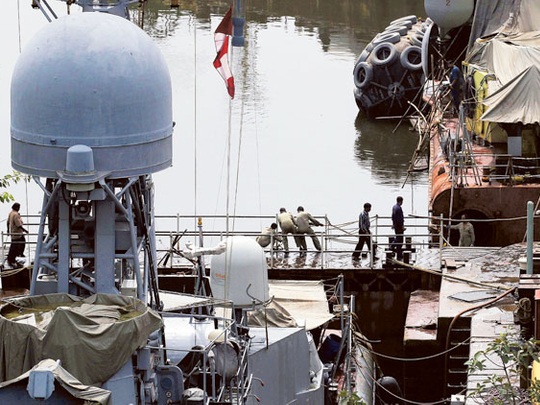
New Delhi: Divers struggled in poor visibility inside an Indian navy submarine on Thursday to find 18 sailors who were inside the vessel when some of its weapons detonated and a fire swept through it as it lay berthed in a Mumbai base.
There has been no sign of life from the Russian-built INS Sindhurakshak since it sank late on Tuesday following two big explosions. It was the biggest peacetime loss for the Indian navy since a war with Pakistan in 1971 and turned the spotlight on its ageing submarine fleet.
The Defence Ministry said a large amount of seawater had entered the diesel-powered submarine, hampering visibility, while the damage caused by the explosion was blocking access to some areas.
“Trapped personnel have not yet been sighted or recovered,” the ministry said in a statement.
The 16-year-old submarine, which had suffered an accident in 2010, had recently returned from Russia after a two and a half year upgrade of its electronic warfare and integrated weapons control systems.
The explosions took place in the vessel’s forward section,/swhere its torpedoes and missiles are stored.
While divers managed to pry open one of the hatches, the heat of the explosion had melted parts of the internal hull twisting the others, blocking access to different compartments, the Defence Ministry said.
INS Sindhurakshak is a Kilo class vessel which were built in Soviet and later Russian shipyards for the Indian navy from 1985 to 2000. The navy has 10 of the submarines and four German HDW boats.
Uday Bhaskar, a fellow at the national Maritime Foundation said the navy’s fleet of conventional submarines was getting smaller by the day. India has not been able to buy new submarines nor build new ones, he said.
“So we’ve been trying to make do with very old platforms,” he said.
This week, though, the navy launched its first indigenously built aircraft carrier and activated the reactor on its first domestically built nuclear-propelled submarine. But both the carrier and the submarine have been decades in the making and will take several years before they are fully operational.
Some experts argue that instead of building expensive aircraft carriers and trying to project power far beyond its shores, the navy should be focusing on its severely depleted underwater arm to counter the growing reach of the Chinese navy.












